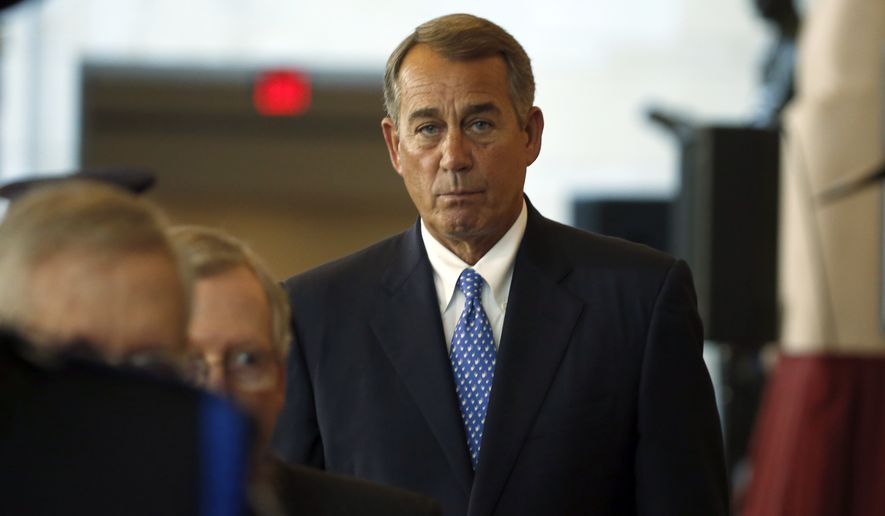The White House and congressional negotiators reached the outlines of a deal Monday to suspend the debt limit and add more discretionary spending to this year’s budget, as all sides look to clear the decks ahead of House Speaker John A. Boehner’s retirement.
Both defense and domestic spending will increase in 2016 and 2017, covered by cuts and revenue increases elsewhere over the next decade, according to early details. Lawmakers were briefed on the outlines, and final language was being written Monday night, with the hope of introducing legislation for a House vote Wednesday.
The deal also paves the way for another debt holiday, allowing President Obama to borrow as much as he needs to keep the government operating into 2017 — meaning he is likely leave office with the total debt nearing $20 trillion.
The deal would divert money to shore up the Social Security disability system’s trust fund, which had been slated to go bankrupt by next year. In exchange, the deal imposes more checks on disability beneficiaries — what backers were calling the biggest changes since the 1980s.
“Negotiations are ongoing, but I hope that Democrats and Republicans will come to a resolution soon that is good for our country,” Senate Minority Leader Harry Reid, Nevada Democrat, said as his chamber opened for business Monday afternoon.
The negotiators include the White House; Mr. Reid; Senate Majority Leader Mitch McConnell, Kentucky Republican; House Minority Leader Nancy Pelosi, California Democrat; and Mr. Boehner.
PHOTOS: Best states for concealed carry — ranked worst to first
The outgoing speaker promised to “clean the barn” of tough issues before leaving, and the talks were a last chance for him to try to win more entitlement spending cuts.
Opposition was already building, both inside and outside Congress.
“Regardless of whatever the timing is, the process is flawed. I’ve said that over and over and over again. This is not the way we should produce legislation. It produces unintended consequences,” said Rep. Daniel Webster, a Florida Republican mounting a long shot bid to replace Mr. Boehner as speaker.
Mr. Webster criticized the legislation for spending money now but offsetting it with savings collected over the next decade.
Conservative activist groups were more biting in their criticism.
“In Washington ’cleaning the barn’ is apparently synonymous with shoveling manure on the American people,” said Michael A. Needham, CEO of Heritage Action, the campaign arm of the conservative Heritage Foundation. “John Boehner is clearly a rogue agent negotiating on behalf of well-connected special interests, not the voters that gave him the gavel.”
PHOTOS: These celebrities are devoutly Christian — and you probably didn't realize it
Liberal groups were just as worried that their leaders would accept a bad deal.
“The White House needs to know that any budget deal that cuts Social Security, Medicare or Medicaid benefits or eligibility for those benefits is unacceptable to the American people and roughly equivalent to declaring a holy war on struggling working families near the kickoff of the 2016 election,” said Jim Dean, chairman of liberal pressure group Democracy for America.
The deal could settle a number of tricky fiscal issues that have piled up, with the ongoing fight over yearly spending bills the biggest of them — chiefly because of the 2011 debt deal’s automatic “sequester” spending cuts that were due to take tens of billions of dollars out of discretionary spending in fiscal year 2016, which began Oct. 1.
Negotiators agreed to add $50 billion back in 2016, split between defense and domestic needs, and another $30 billion in 2017, also split evenly.
Republicans had initially proposed an increase in defense spending without any new domestic spending. Democrats then launched filibusters to gum up the entire spending process in retaliation, leaving the government operating once again on a stopgap crisis basis.
That funding runs out in December, and Monday’s deal would send the spending committees back to work with a new top-line number.
The most immediate deadline, however, is the debt level.
The Treasury Department has been using gimmicks since March to keep from breaching the limit, but will run out of space next week.
Monday’s deal calls for a debt holiday until early 2017, or a $1.5 trillion debt level increase that would last about the same length of time, pushing the issue into the next president’s term.
Mr. Obama has already overseen the fastest debt increase in history.
The red ink tally stood at $4.2 trillion when President Clinton took office, rose during his eight years to $5.7 trillion, then nearly doubled to reach $10.6 trillion at the end of President George W. Bush’s two terms.
Nearly seven years into Mr. Obama’s tenure, total debt is $18.2 trillion, and will likely leap several hundred billion dollars the moment Congress approves a borrowing increase.
⦁ Tom Howell Jr. contributed to this report.
• Stephen Dinan can be reached at sdinan@washingtontimes.com.




Please read our comment policy before commenting.